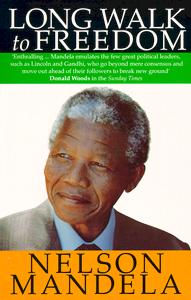“Long Walk to Freedom” – Nelson Mandela
Nelson Madela’s autobiography, “Long Walk to Freedom,” is the best book I’ve read so far in here. I love that every story ends with some form of “A Freedom fighter must always remember…” as Mandela shares his take-away lesson. There was so much that happened in his life, and so many lessons for activists in the way that he told it, that I’m hesistant to choose just one or two. So I’ll just share my favorite quotes from the book.
“In love, unlike in politics, caution is not usually a virtue.” p.81
“The freedom struggle was not merely a question of making speeches, holding meetings, passing resolutions, and sending deputations, but of meticulous organization, militant mass action, and above all, the willingness to suffer and sacrifice.” p.104
“He had committed the cardinal sin of putting his own interests ahead of the organization and the people.” p.138
“Banning not only confines one physically, it imprisons one’s spirit…The insidious effect of bans was that at a certain point one began to think that the oppressor was not without but within.” p.144
“Nonviolent passive resistance is effective as long as your opponent adheres to the same rules as you do. But if peaceful protest is met with violence, its efficacy is at an end. For me, nonviolence was not a moral principle but a strategy; there is no moral goodness in using an ineffective weapon.” p.158 (I agree with the last sentence but not the first two.)
“Politics can be strengthened by music, but music has a potency that defies politics.” p.178
“A nation should not be judged by how it treats its highest citizens, but its lowest ones.” p.201
“I have always believed that to be a freedom fighter one must suppress many of the personal feelings that make one feel like a separate individual rather than a part of a mass movement… In the same way that a freedom fighter subordinates his own family to the family of the people, he must subordinate his own individual feelings to the movement.” p.228
“There is a streak of goodness in men that can be buried or hidden and then emerge unexpectedly.” p.260
“I was the symbol of justice in the court of the oppressor, the representative of the great ideals of freedom, fairness, and democracy in a society that dishonored those virtues.” p.317
“…to plead guilty would to my mind indicate a sense of moral guilt.” p.369
“The challenge for every prisoner, particularly every political prisoner, is how to survive prison intact, how to emerge from prison undiminished, how to conserve and even replenish one’s beliefs… Prison is designed to break one’s spririt and destroy one’s resolve. To do this, the authorities attempt to exploit every weakness, demolish every initiative, negate all signs of individuality–all with the idea of stamping out that spark that makes each of us human and each of us who we are… There are victories whose glory lies only in the fact that they are known to those who win them. This is particularly true of prison, where one must find consolation in being true to one’s ideals, even if no one else knows of it.” p.390
“In prison, one likes to be around men who have a sunny disposition.” p.455
“Prison is a still point in a turning world, and it is very easy to remain in the same place in jail while the world moves on.” p.502
“I loved my enemies even while I hated the system that turned us against one another.” p.568
“It seems to be the destiny of freedom fighters to have unstable personal lives. When your live is the struggle, as mine was, there is little room left for family.” p.600
“Perhaps it requires such depth of oppression to create such heights of character.” p.622
“I learned that courage was not the absence of fear, but the triumph over it… The brave man in not he who does not feel afraid, but he who conquers that fear.” p.622
“Man’s goodness is a flame that can be hidden but never extinguished.” p.622

Leave a Reply